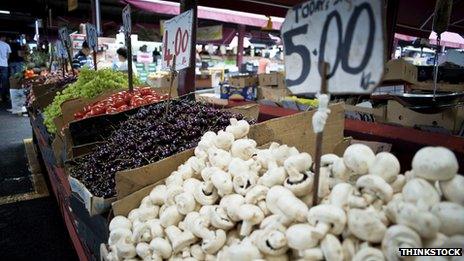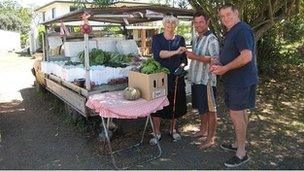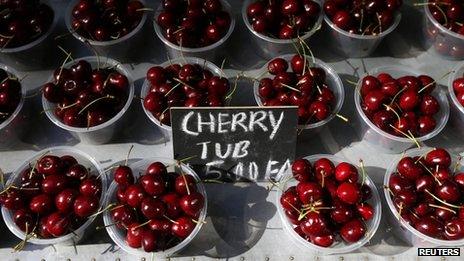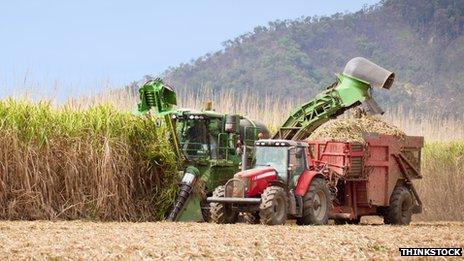Australia's small farmers struggling with low prices
- Published

Australian farmers are having to deal with increased imports of fruit and veg
A near-perfect growing season for small farmers in two of Australia's biggest food belt regions - south-east Queensland and Victoria - has produced a bumper crop.
But despite a bountiful yield, there is a nasty sting for numerous family-run farms as oversupply has driven down prices.
It should be a time for celebration for growers, who have become hardened to a relentless cycle of droughts and floods in recent years. Instead many are complaining that they are being paid less at wholesale markets than the cost of harvesting their crops.
At Peak Crossing, south-west of Brisbane, Wayne Allum saw part of his 10-acre (four-hectare) property disappear under murky brown floodwaters last year, but has now enjoyed textbook weather conditions following a mild Antipodean winter. Yet still he frets about his financial future.
"It's a hard game sending your stuff to the markets and then not knowing what you're going to get for it. It is stressful and disheartening," says the former truck driver, who grows tomatoes, lettuces, cabbages, courgettes, and spring onions.
"Prices were terrible compared to what it costs you to grow them, get them picked, grade them, box them and send them to the markets," he adds. "I won't send my stuff to the markets any more."
Instead, he sells his produce from the back of a truck parked under the shade of a jacaranda tree on the main road to take advantage of passing trade.
"It's not a huge living," says Mr Allum. "I'm better off just growing what I can, do everything myself and just sell it at the farm for a profit and make a living that way."
'Alarming'
The number of farmers in Australia is shrinking, and it's not just the current domestic oversupply that is hurting the bottom line.
The amount of imported fresh produce has reached record levels, and Mark Vogler, owner of the Aratula Markets in Queensland, says growers are facing unfair competition from overseas imports, which he says are of lesser standard.

Wayne Allum (centre) sells his produce direct to members of the public by the side of a road
Mr Vogler sells fruit and vegetables from local farms and wants prices to be set by the federal government to guarantee those on the land a decent return. If not, he believes the sector will continue to contract.
"To see how fast the farms are going backwards has been alarming," he adds. "The Australian public doesn't know about it yet. The problem is once we do lose the ability to feed our people locally, we'll have to rely on produce that has come in from overseas unregulated."
Export drive
Ausveg, the industry body representing 9,000 of Australia's vegetable and potato growers, which generates about 4bn Australian dollars ($3.8bn; £2.4bn) per year, believes that financial security for its members lies far beyond the horizon.
Australian carrots are an unlikely hit in Singapore and the Middle East, along with asparagus, humble fresh potatoes and leafy greens.
Last year, just 7% of Australia's fresh fruit and vegetables were exported, but Hugh Gurney from Ausveg wants that to change.

More and more Australian farmers are now looking at exporting
"There is a lot of product entering the market, and it makes it tough for growers to get a decent price for their product," he says.
"As a result the Australian vegetable industry is looking more and more to overseas markets to supply fresh produce to Asia and hopefully relieve some of the oversupply in the domestic market."
Yet Australia is so big that conditions for growers vary immensely, as do the triumphs and challenges, including October's bushfires in the Blue Mountains, west of Sydney, where some of the worst bushfires seen in New South Wales tore across vast swathes of forest and farmland.
Perched off the southern coast is the "apple isle" of Tasmania, so nicknamed because it has long produced large crops of the fruit.
The island of course grows many other crops, and artisan farming has blossomed on the island state in recent years, where small enterprises beaver away making high-value, niche specialities, including hand-ground spelt and rye flour along with boutique jams and relishes.
Crucially, the industry has established direct links to the public, according to Jan Davis, chief executive of the Tasmanian Farmers and Graziers Association.
"The thing that our small farmers do very, very well here in Tasmania is build on that relationship directly with consumers. So we've got a very strong farmers' market and farm gate sector down here," she says.
Tasmanian farmers are also leading the way on exporting extensively.
"We have product going right across the globe into Asia, Europe and the Americas. Just about anywhere you can think of there is Tasmanian product on a table somewhere," Jan Davis adds.
'Can't walk away'
But Tasmania's optimism gives way to a sense of gloom in other parts of Australia.

Australia's sugar industry has been affected by overseas competitors
In Queensland's sugar capital, Bundaberg, Mark Presser, a fourth generation cane farmer, enjoyed a record crop last year, and is on course to harvest another reasonable yield this time around.
Yet he too feels besieged by falling prices and growing competition from overseas, most notably Brazil and India, where production costs are far less. He also complains about protectionism in Europe and the US.
"Some days you wonder why you are doing it. We've got that much money tied up (in the business) we just can't walk away," says the 47-year old farmer, who owns 270 acres (110 hectares) of land.
"The majority of the people who live in the big cities have got no idea at all how hard it is," he adds.
He warns about the fate of other family-owned operators. "There aren't too many little ones left," he says. "They are just standing on the edge of the precipice and are on borrowed time."